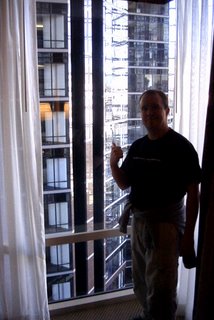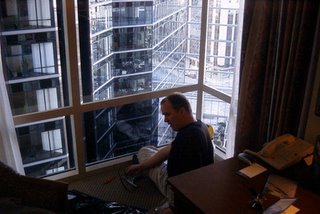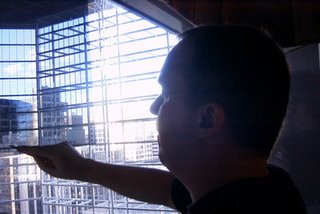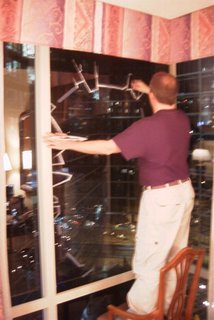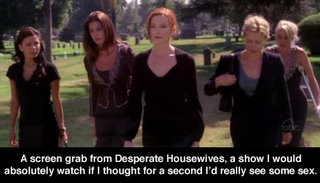Hi folks. No posts in a while, I know, but here's a subject near and not so dear to my heart, apropos to the whole state of filmmaking in Austin, Texas. Such as the fact that there isn't any.
If Austin weren't a wonderful place to live in so many ways, I wouldn't have spent so many years living here. And Austin likes to pat itself on the back for many things. There's our rumored music scene, which has led to the town's adopting the unofficial nickname of "Live Music Capital of the World." I remember seeing a lot of live music, oh, ten years ago, and I look in our local weekly "alternative" paper the Chronicle and see numerous live gigs listed. Do I get excited about much of it these days? Not really. But maybe I'm just getting old.
In recent years, though, Austin has started seeing itself as some sort of filmmaking Mecca. This isn't altogether new, of course. Filmmaking has been something of a vibrant underground activity around here for years, and as much as 20 years ago I recall coming up here for seminars and things, before there was a South by Southwest festival officially sponsoring them.
There is also a wealth of talent here. Simply loads of eager and enthusiastic film professionals in every category who love nothing more than to roll up their sleeves and get stuck in for 14 hours a day on a shoot in 104° heat and make movies. But for all the city's preening and posturing about the film scene here, there's just one thing lacking: an industry to support any of it. Hey, we've got great theaters, we have our adopted trophy celebrities, we have Quentin Tarantino popping up like a jack-in-the-box every now and again, and we even have a fake awards show. But what we don't have is a film industry. Which is why you see so many of Austin's underemployed film talent shooting mini-DV movies no one will ever see in their apartments with crews they can't pay.
You can have all the talent in the world at your disposal if you want to be a real filmmakers' town, and it will mean neither jack nor shit if there is no one investing money in productions. And by money, I don't mean the rinkidink $50,000 (or less) feature film budgets that most hapless indie filmmakers have to grit their teeth and live with. I mean, some serious venture capitalists putting $1 million and $2 million and even, fuck it, $8 million budgets together to help filmmakers make movies they can actually sell to a distributor. But I can tell you, from personal experience, that if you tell people in Austin that you want to produce an independent feature film, and they say, "Awesome, what kind of budget are you talking about?" and you answer, "I think $1 million ought to do it," their eyes go as big as dinner plates and they goggle at you as if you've just undone your fly and taken out your dick and there was a fish on the end of it. Shock! Horror! Disbelief! One muh-muh...did you say million dollars? To make a movie with? Are you mad? Who do you think you are, anyway? James Cameron? Why can't you do it for something reasonable...say, seven thousand? After all, Robert Rodriguez did.
Ah, and there's the rub. The Rodriguez curse. Now, let me clarify one thing right away. I like Robert and am damn proud of him. He and I were fellow cartoonists at The Daily Texan at the end of the 80's; I did Hepcats, which went on to spend the 90's as a money-losing but personally fulfilling alternative comic book, and he did Los Hooligans. He was always a great, easy going guy, even for many years after he hit it big. Though now I understand construction on the ivory tower is complete and the little people can no longer talk to him. But for a while, he was a down-to-earth guy and he did a lot to raise the profile of Austin in Hollywood's eyes. Kudos all around.
But the problem is the effect his D.I.Y. success has had on perceptions in Austin. Austin is still, and probably forever will be, intoxicated by Robert Rodriguez and the Myth of the $7,000 Movie. Again, clarification is called for: yes, Robert did shoot El Mariachi for a mere seven g's. However, the version of that movie anybody has actually seen — the one that Columbia released in 1993, and that's on DVD right now — cost in the neighborhood of $150,000, which is what Columbia had to spend to get that precocious little production into releasable shape.
Do you know how it goes, when someone wins the lottery, and the following week, hundreds of dimwits flock to the specific convenience store where that winner bought his ticket, thinking that perhaps since one winning ticket was bought there, that must be where all the winning tickets are hiding? This sort of foolish, magical thinking seems to permeate the minds of many people in what could loosely be termed Austin's filmmaking community. Hey, this guy Rodriguez just spent a little bit of money, and look where he is today! All I have to do is exactly what he did, and since I'm obviously as smart and talented as he is, I'm bound to have the same success! Easy!
The foolishness of this is partly what has led to the current bleak situation in Austin filmmaking. It's almost Troma-like, when the best our city can boast about are shot-on-video zombie movies. But there are other factors to blame, of course. As far as real productions are concerned, as you can see, not much is happening. Texas as a whole has been hemorrhaging major studio productions into Louisiana, which has offered Hollywood tax incentives from the gods. And of the few studio productions that do still come here, they are usually entirely crewed up by the time they arrive. The fine folks at the Austin Film Society and Texas Film Commission — what help are they to local crews? None at all. They're simply all too happy to pull on the kneepads and service these big productions any way they wish. Do they put forth any effort to liaise between local crews and studio productions? Do they actually have a representative who sits down with these production managers and says to their faces, "Hey, Hollywood, don't sweat it, we have gaffers, and production designers, and storyboard artists, and construction crews, and DP's, and AD's, and PA's, and pretty much anybody and everybody you could want to pull your shoot together!" No. They don't.
Austin has all sorts of potential as a real filmmaking hub. Naturally, I cannot find fault with the actual filmmakers themselves, who pull a shot-on-video zombie movie together simply because, hell, making something is better than making nothing. But until the real movers and shakers in this town start treating Austin film seriously as an industry rather than an exciting sideshow, and backing that up with credible financial commitments, filmmaking in Austin will have the same reputation as that of its "Live Music Capital of the World" boast. All talk. No walk.

